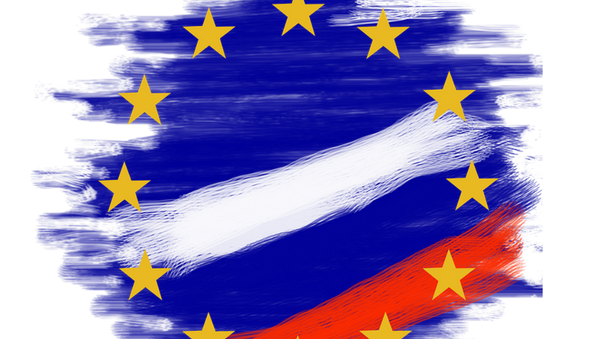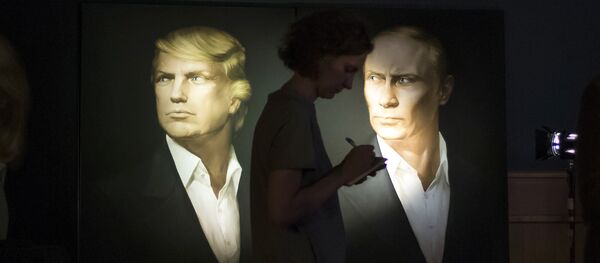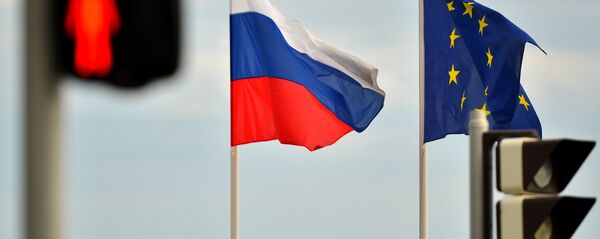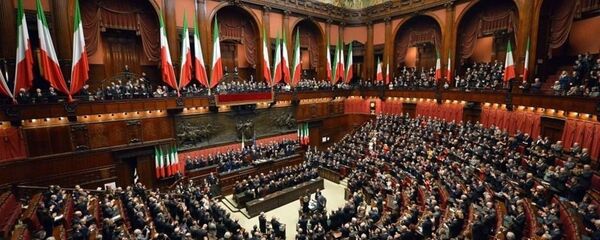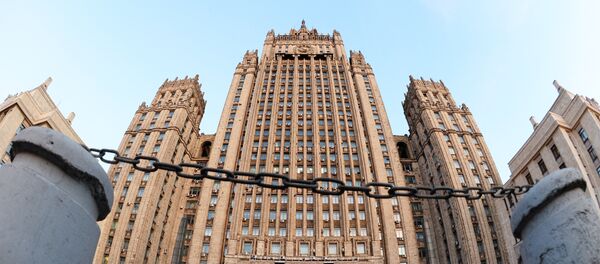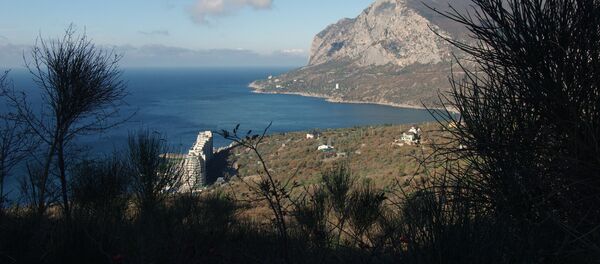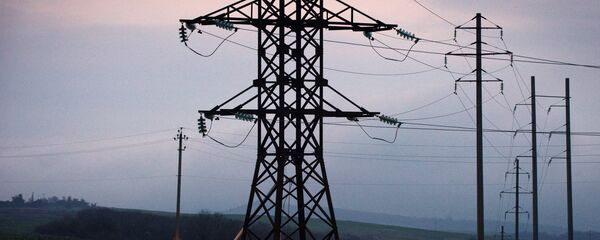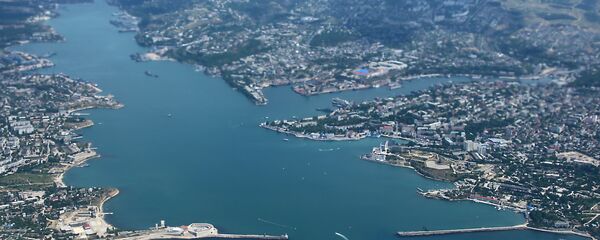MOSCOW (Sputnik) – The future looks more uncertain than ever for Western sanctions and the refusal to recognize Crimea’s reunification with Russia after Donald Trump’s 2016 presidential election win stunned Brussels and heartened anti-establishment parties in EU core nations.
Washington subjected dozens of people in Russia’s mainland and in the Black Sea peninsula in March 2014 to travel bans and asset freezes and imposed sweeping economic sanctions on Russia in April and July of that year, citing its alleged meddling in the Ukrainian crisis.
The European Union and other Western nations followed suit as the fighting in southeastern Ukraine peaked that summer, passing curbs on Russia’s banking, energy and military business. EU member states need to renew economic sanctions against Russia collectively every six months.
TRUMP TURNS TABLES ON RUSSIA SANCTIONS
Trump’s surprise suggestion he could "get along very well" with Russian President Vladimir Putin and review Crimea-linked sanctions against Russia if elected to the White House stirred controversy in Europe last July.
The then Republican flag-bearer added fuel to the fire when he confirmed he would "look at" whether the United States should recognize Crimea as Russia’s sovereign territory, after a March 2014 referendum in the Russian-majority region found almost 97 percent voted to leave Ukraine.
"I'm going to take a look at it," Trump said in an interview to ABC News. "But you know the people of Crimea, from what I've heard, would rather be with Russia than where they were. And you have to look at that."
These remarks prompted an outcry from Congressional Democrats that grew louder after the December appointment of former Exxon Mobil CEO Rex Tillerson as the US secretary of state. Tillerson has a business history with Russia where his oil firm searched for fossil fuels in the Arctic until two years ago.
German Chancellor Angela Merkel sought to distance EU policy-making process from that in Washington, saying Trump’s stance was discussed but did not affect the final decision. "We reached an agreement based on the existing situation [in Ukraine] without making predictions about what the incoming US president might do," she assured reporters.
EUROPE ON EDGE AHEAD OF 2017 ELECTIONS
Washington’s anticipated about-turn on Russia and Crimea’s recognition under the incoming administration has raised hopes of electoral success among eurosceptic parties in France, Italy and Germany who have long been advocating a reset in ties with Russia.
In France, both chambers of parliament passed separately two resolutions in April and June 2016 that called on the unpopular Socialist government to loosen sanctions on Russia. Although having no legal force, they signaled dissatisfaction with the policy in French regions.
Michel Terrot, Fillon’s fellow party member from The Republicans and a lawmaker in the lower house of the French parliament, indicated a majority of opposition presidential candidates "look favorably" on a reset in ties with Russia. "Sanctions are painful for the French as much as for the Russians," he said.
In Italy, several regional councils passed resolutions in the outgoing year that urged the central government to scrap sanctions against Russia and condemn the harsh EU policy on Crimea. The bloc’s official stance is that it regards Crimea’s reunification with Russia as annexation.
Italy reportedly took the lead last October in a pushback against UK, German and French proposals to slap more punitive measures on Russia over Syria at a leaders’ summit in Brussels, while Austria, Spain, Greece and Cyprus voiced their reservations.
Lega Nord leader Matteo Salvini told Sputnik in November his right-wing party had unsuccessfully tried several times to get a motion through the Italian and European legislatures to lift anti-Russia sanctions and resume a normal dialogue with Moscow.
Germany has been one of the most vocal opponents of Crimea’s decision to leave Ukraine for Russia and has conditioned any future easing of economic curbs to progress in war-torn southeastern Ukraine, where militias and the EU-backed government in Kiev are both struggling to abide by the Minsk roadmap for peace.
German Vice Chancellor Sigmar Gabriel, who will possibly challenge Angela Merkel as chancellor next fall, was the first to break with Berlin’s tradition of blaming Russia for slow progress on the Minsk deal when he admitted it was a "responsibility of not only Russia but also Ukraine."
Gabriel said during his visit to Moscow in September he was convinced isolating Russia was "not a sensible policy." "Russia is our neighbor and also a very important global actor. Exactly now when we have profound disagreements we need a dialogue, not ‘ice age,’" he said.
EU LOSES REVENUES TO RUSSIA SANCTIONS
The extension of EU’s economic restrictions on Russia past the January deadline does not mean the 28-nation bloc wants to end economic cooperation with Moscow, German government spokesman Steffen Seibert claimed in December.
Germany is the second largest EU exporter to Russia after the Netherlands. EU sanctions and Russia’s counter-measures cut German imports in 2014-2015 by 13.5 billion euros ($14 billion) and slashed 60,000 jobs in Germany, according to July’s study by Bremen and Leipzig universities.
Italy, one of EU’s top exporters to Russia, has lost some $6.3 billion since the introduction of sanctions, while Finland, which has been in top 15 of Russia’s importers, has seen its economy shrink by 1 percent of the gross domestic product.
FOREIGN VISITS MELT ICE AROUND CRIMEA
Despite this, the flow of foreign lawmakers, business executives and tourists has not ebbed this year after a group of French parliamentarians first defied Brussels and Paris to fly to Crimea’s capital Simferopol in summer 2015.
An 11-member delegation led by French Foreign Affairs Committee’s Thierry Mariani came to Crimea in July to get a first-hand experience of how things had changed in the region two years after its secession from Ukraine.
"The picture we saw in Crimea is far from what the western media tries to build," Michel Terrot, a member of the National Assembly, told Sputnik after coming back from Crimea. "One gets the feeling that a historic error has been corrected once Crimea reunited with Russia."
Over 60 foreign delegations came to Crimea in the first eight months of 2016, the republic’s Deputy Prime Minister and envoy to the Russian president, Georgy Muradov, told reporters in August.
Apart from French visitors, Crimea welcomed lawmakers, officials and entrepreneurs from Italy, Germany, Jordan, China, Bahrain, Turkey and the United States. Some came secretly or despite warnings from national governments and authorities in Kiev.
Visitors underscored losses EU nations had suffered from curbs on investment and trade with Crimea, with Italy’s northeastern Veneto missing out on $1 billion in lost revenues, according to Stefano Valdegamberi, who came to Crimea together with a group of 18 lawmakers and business people from five Italian regions in October.
Italian firms are trying to reverse the losses by moving production to the region, Valdegamberi told reporters in Simferopol. "A good number of them are already operating in Crimea … they don't just want to sell some stuff in Crimea but produce goods here," he said.
Speaking on the official attitude to such visits, France’s Mariani said the Foreign Ministry’s reaction was very low-key this year, in what he referred to as a sign of an "evolving political climate" between the two countries.
Crimea’s envoy to President Vladimir Putin, Muradov, said in December the region was emerging from months of isolation after Trump’s refusal to rule out a rapprochement with Moscow "softened the tone of other politicians" and cracked the ice around Crimea on the world stage.

